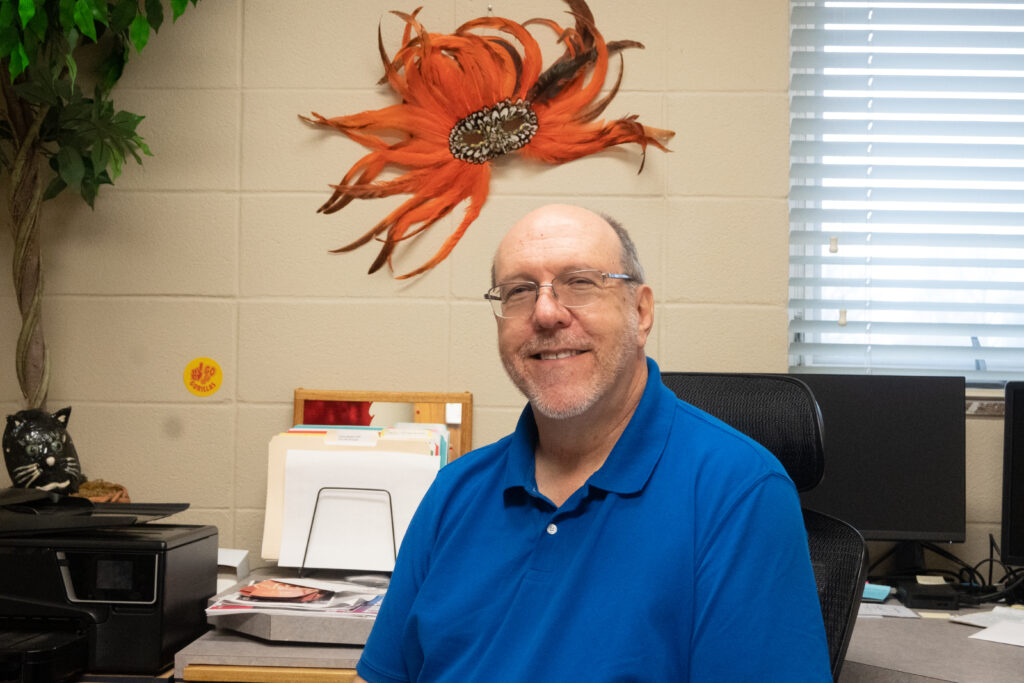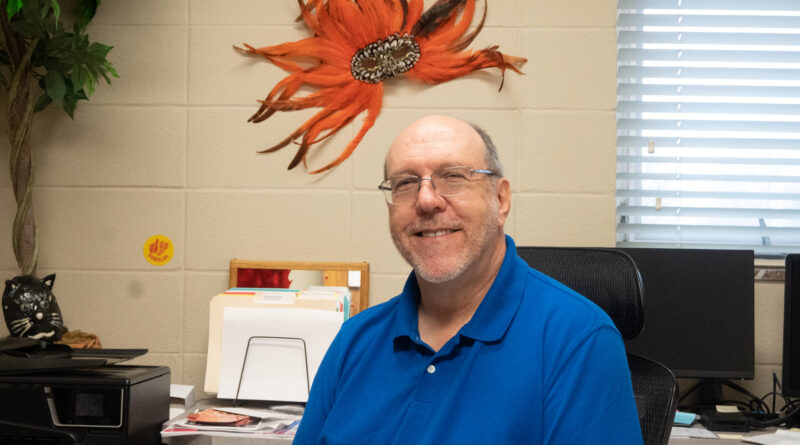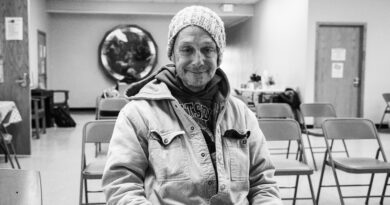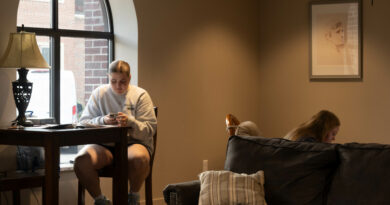Profile: Gil Cooper
By Leticia Juang
It’s 10 a.m., and Gil Cooper takes a sip from a can of Coke in his office. It’s one of the last days he can do so from Grubbs Hall, where he’s spent more than three decades teaching in Pittsburg State University’s communication department.
That’s because in May, 60-year-old Cooper will retire. His office on the second floor, adorned with family portraits, binders of old coursework, an orange Venetian mask, two bookshelves—it will all be history, and Cooper will look on to new things.
After 33 years teaching at Pitt State, focusing on things like presentational communication, small group communication and communication education, Cooper is reflective, remembering moments inside and out of class. To those around him, it’s difficult to imagine that it won’t involve education in some way.
“Teaching is his passion,” said his wife, Casie Hermansson. “Education is his love.”

Before the classroom
Gil Cooper was born in Mexico but grew up primarily in Columbia, Missouri, as an only child. His father, once a California college dropout, is now a retired college professor after over 40 years of teaching his own. Cooper’s mother was Mexican and a Polish-descendant, who moved to the U.S. to raise Gil and support her family.
Cooper has a strong interest in acting that goes back to his childhood. During a summer program at Stevens College in Columbia, Missouri, he got to play the “Magic Cow,” and he played Tom Sawyer’s Huckleberry Finn the next year. Those opportunities later led him into acting classes. By junior high, he was growing interested in speech as well, and he eventually majored in both speech and dramatic arts.
“I also had a very memorable, positively memorable, speech teacher in junior high,” said Cooper. “I always enjoyed performance, [so] I started appreciating the speech aspects as well.”
Gil pursued a professional acting career in New York City for a while—what he calls an amazing but challenging experience. He wanted to teach to inspire others, just like he was inspired during school years. One challenging year, that led him to earn his teaching license and certification, enabling him to teach acting. It also drove him to pursue his master’s degree.
That same year, Gil met professor Carey Southall who, later on, helped him land his very first teaching position. This is just one of those magical moments in education where a teacher helps a student—and in this case, Gil was the one who had some help.
There are plenty of other examples in which he was the one helping.
“Teachers are just a stepping stone for the students,” Cooper said. “So I get this opportunity to work with amazing people, amazing students, and you hope that you can be a positive stepping stone, that you can help them along the path.”
“It’s kind of an interesting profession [teaching], because the moments are really really short,” Cooper continued. “But you have hopefully impact on those people, that they carry with them”
Sometimes, Cooper said, you don’t even realize you’re making a difference at the time. He remembered getting a “thank you” postcard from a student in the mail. The sender said that his energy and enthusiasm helped her during a tough time she was battling and got her through college.
At first, he didn’t recognize the name on the card. Later, after going through his rosters, he recalled that she was a quiet student in his classes.
“Life is this process,” Cooper said. “Learning is a process. We are what we have been and what we have been through.”
Touching lives at Pitt State
In 1992, Gil Cooper started teaching in PSU’s communication department. It was there that he met Casie Hermansson in the halls of Grubbs Hall’s in the spring of 1998. Hermansson was in her second semester as a professor in Pitt State’s English department, and friends wanted to set them up.
“I remember thinking ‘oh, that’s a lovely laugh that this person has,’” she said. That laugh was the start of a long relationship—one that has included 25 years of marriage and two kids.
Cooper’s students say he’s an instructor who is genuinely interested in their well-being in and out of class and truly invested in his classes. One such student is Abbey Eddington, a 24-year-old marketing coordinator at Crossland Construction. She said Cooper’s compassion was clear in the classroom.
“The first test he gave I literally stayed until the very last minute trying to find the answers,” Eddington said. “I had one I couldn’t find and just put ‘I tried.’ When I got my test back, there was a smiley face and only half a point missing instead of a full point. It made me feel like he understood how hard I was working, and that was rewarded.”
Cooper, she said, taught her that life is about constantly learning to be a better version of yourself—and she added that she could always count on him to have some pizza and Coke on his desk.
“There are no regular days of class with Gil,” Eddington said. “One thing was guaranteed when coming to Gil’s class: You will laugh, and you’ll hear his oh-so-recognizable laugh too.”
The next steps
Cooper says he is now ready to take a step back, retire on his own terms and relax after 36 busy years of teaching.
“It sounds kind of sorry to say ‘I’m tired,’ even though I enjoyed it,” he said. “But it has been a long time, and teaching is a demanding profession.”
He said he’s ready to take some time for himself and to explore a few of his favorite topics. He’d still like to help coach people on giving presentations and might even teach every now and then.
Cooper also wants to spend more time with his work in the tabletop board game industry, a passion he’s had even longer than he has been teaching. He plans to work at three conventions during the second half of 2025.
“He is very sociable, [with an] extroverted personality, and I think it’s important to make sure he has lunch plans every day with someone, because he loves to go out, and eat lunch, and have conversation,” Hermansson said, glad that he’s ending this chapter of his life with a reminder of the things he loves about it.
As for Cooper, he’s happy with a little uncertainty after a long career in the classroom.
“I don’t know [what the future holds],” Gil said lightheartedly, in a way that makes everything seem connected and that everything happens how it’s supposed to. “And I’m okay with that.”



